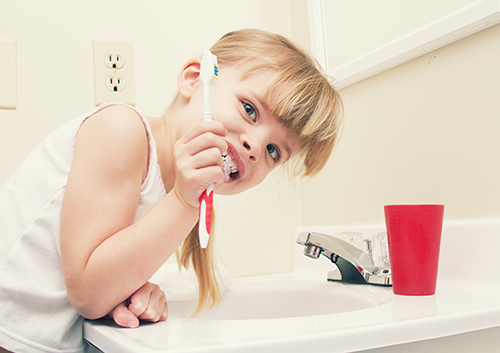Going Green for St. Patrick’s Day?
March 17th, 2021

Happily for all of us who like to celebrate with friends and family, there’s no need to be Irish to enjoy St. Patrick’s Day. Every March 17th, many of us take the opportunity to display a bit of Gaelic spirit.
- Green Clothing (it’s tradition!)
- Green Hat (for a jaunty look)
- Green Shamrock (always the perfect accessory)
- Green Hair (for the adventurous among us)
- Green Grins?
Here’s where we draw the line. Emerald Isle? Delightful! Emerald smile? Not so beguiling.
That traditional St. Patrick’s party fare—green-frosted sweet treats and green-colored pastries and green-foamed beers—is full of green-tinted food dyes, which can leave us with teeth in subtle shamrock shades. Luckily, most of us will have only a very temporary tinge to remind us of our dietary shenanigans, and there are simple ways to rid yourself of the green sheen:
- Indulge sparingly in colorful cuisine, and drink water afterwards to rinse away green-dyed foods and beverages.
- Use a straw for green drinks.
- Brush your teeth. (Not only will you brush away the green, but you’ll brush away the sugars from sweet green desserts and the acids from sour green brews.)
- Try a whitening toothpaste.
One special note: if you’ve just whitened your smile, best to eliminate strong food dyes from your diet for a few days. Teeth are more sensitive to staining after whitening, because the whitening process temporarily makes them more porous. Give yourself a few days, and your enamel will be back to (stain)fighting strength.
So, celebrate on the 17th and feel secure that on the 18th, your smile won’t be “wearing the green” any longer. But if you find that you’re not happy with the appearance of your smile anytime during the year, if you have more permanent staining caused by natural darkening over time, or workdays fueled by black coffee, or a diet filled with tomato sauce, dark berries, red wine, and other tasty (but discoloring) food, you’re still in luck.
Ask Dr. Dale Scharine and Dr. Alissa Edwards about professional whitening procedures at our Appleton, WI office for a brighter, more confident smile. And with a bright, confident smile, every day’s a reason to celebrate!




 Website Powered by Sesame 24-7™
Website Powered by Sesame 24-7™